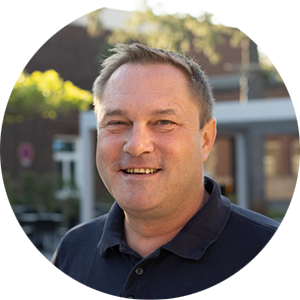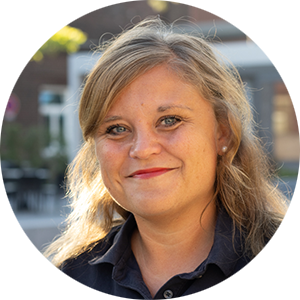In twelve presentations by renowned experts, the topics of hydrogen, electromobility, eFuels and their respective impact on the fuel retail industry were explained. The participants received exciting insights into best practices and a collection of interesting ideas on how the petrol station of the future should be optimally designed and which services should be offered. Pitfalls that are slowing down or complicating the current development were also pointed out.
Attendees were also able to delve into the world of convenience retailing. They learned about unmanned and fully automated store concepts and new technologies that will play an important role in the future.
In his welcoming speech, host and CEO of Scheidt & Bachmann Fuel Retail Solutions GmbH, Jörg M. Heilingbrunner, showed that today's petrol stations have to do much more than just sell fuel. Petrol stations are increasingly developing into mobility hubs with a wide range of services. Companies of the parking industry are now entering the market and, together with BP and Shell, are showing the first concepts of what the mobility hub of the future could look like. As the energy mix grows, market players change and competition intensifies, there is real potential for the forecourt business that needs to be tapped.
In his Convenience Briefing, moderator Mark Wohltmann took us on a "Tour d'horizon Convenience Retail". As Director NACS Global, he has a broad knowledge of the global convenience retail industry. Important success factors today are hospitality and technology. Special attention should be paid to the younger generation. Digital natives attach importance to different things than we are used to. As an example, he mentions the topic of "voice". Voice control is in the starting blocks and will gain in importance. Young people no longer write messages, they dictate them. Technology will help us connect with customers. To learn more about them and optimise our offer. Examples show that this is already working well for some providers and the technology is already there. We just need to use it.
Patrick Steppe, CEO, Lekkerland SE, very impressively explained the development from the simple petrol station, where there was only the petrol pump, to the petrol stations as we know them today with several thousand shop items and other services offered. But the development of the car also has a great influence on the industry as we know it today. The electric-powered vehicles are influencing the technology-driven development of petrol stations and thus they also have an impact on the shop business. The competition for e-vehicle customers is becoming bigger and more diverse. New players are entering the market and in the future, customers will decide where to charge or refuel their vehicles based on what is on offer. Steppe sees clear room for improvement here. The customer experience at petrol stations is not yet good enough and can be significantly improved through innovative shop concepts and modern technologies. There are already examples on the market. Some are already being used successfully, others are in the trial phase. The industry is currently undergoing what is probably the greatest upheaval, and it is important to take advantage of this and, by means of good ideas, offers and suitable technology, create a customer experience that binds customers and contributes to the success of the business.
In her presentation "Reload - more than Batteries", Christine Scharinger, CEO - Founder, Scharinger Consulting e.U., made it clear that the charging park of the future is about more than just charging the car battery. Drivers should have the opportunity to spend their time in a meaningful way. An offer that goes beyond sanitary facilities and gastronomy is desirable. Examples of additional offers are office space, recreational areas with fitness, playgrounds or special areas for dogs. But even things that are actually taken for granted, such as free Wi-Fi, photovoltaic systems for generating green electricity or sufficient parking spaces, as well as hoovers or tyre pressure testers, are not yet a matter of course today. Positive examples already show that some locations respond better to drivers' needs than others. But there is still room for improvement here, too. The European AFIR regulation sets the rules for the expansion of the charging infrastructure. Although this provides a direction, it still has some gaps that need to be closed. Especially with regard to the increasing number of vehicles with alternative drives, this should be taken into account even more clearly.
Harald Pöpke, Teamlead Checkout & API Solutions at Scheidt & Bachmann Fuel Retail Solutions GmbH, rounded off the Convenience Retail Panel with his presentation on innovative checkout solutions and how they can improve processes along the entire value chain. Due to the fact that the entire environment in which petrol stations operate today is becoming significantly more complex, new and innovative solutions are needed to improve the customer journey and make it easier. But not only the customers are relevant. The company's own employees must also be included in the overall consideration. Modern technologies show that processes are not only simplified for the customer, but that the company's own employees also benefit from the time saved by innovative solutions. Modern payment terminals or self-scanning apps, with which customers control the payment process independently, are the focus here. Employees can thus be deployed more efficiently and thus noticeably improve the service for the customer. During the break, the visitors were able to experience live a product demonstration of the solutions Scheidt & Bachmann offers in this context.
From the perspective of a "start-up", Olaf Borbor, CEO at JET H2 Energy Germany GmbH, reported on his experiences in the field of hydrogen. Whereas electricity is a suitable energy source for passenger cars, he clearly sees truck transport as the target group for hydrogen. Currently, the infrastructure is under construction and there is still a lot to do. Compared to conventional filling stations, the construction of a hydrogen filling station is much more complex. Especially the import is a challenge, but also the number of vehicles on the market is still low. Here, car manufacturers should focus more on the production of hydrogen vehicles.
RWE and Westfalen AG have also set themselves the goal of expanding the hydrogen infrastructure. In their joint presentation, Frank Slebos, Head of German H2 Mobility Project with Westfalen, RWE Generation SE and Matthias Dieke, Head of Hydrogen Mobility, Westfalen AG emphasised that hydrogen will make an important contribution to the energy transition. They also made it clear that sustainably produced hydrogen is essential in order to reduce CO2 emissions. In addition to the expansion of the corresponding infrastructure, the availability of fuel cell trucks and competitive green hydrogen are necessary prerequisites for the successful acceptance of hydrogen as a fuel alternative to electricity in heavy-duty transport.
Jan Petersen, Managing Director, TotalEnergies Charging Solutions Deutschland GmbH, devoted his presentation to electricity as a drive source. He explained very clearly that the market is changing and that the competitive situation will also be different. Where people used to fill up exclusively at petrol stations, there are now a large number of places where they can charge their electric cars. In the future, he sees the private environment as the focal point where charging will take place. In addition to charging at home, this also includes charging at work or in the depot for commercially used vehicles. In the public sector, charging will be distributed more or less evenly among charging hubs, on the street or in so-called destinations, such as supermarkets or restaurants. In addition to the demand for cars, he also expects the truck segment to grow in importance.
Dr Hans Henning Thies, Head of Business Development & Member of the Management Board, GP JOULE Connect GmbH made it clear that it is not only energy that is needed, but that it must also be used intelligently. Green energy should be used when it is produced or, better, produced directly where it is needed. In all of this, the customer must also remain in focus. They must be taken along on the journey and understand how they can contribute to the energy transition. Supporting tools are apps that display current energy consumption and provide tips on how to improve one's own behaviour. Simplifying and standardising payment solutions for customers or intelligent systems that enable dynamic pricing will also contribute to the success of modern charging parks.
Verena Hiegemann, Product Management Lead New Mobility & Cashless Payment, Scheidt & Bachmann Fuel Retail Solutions GmbH, also emphasised in her presentation that charging should always focus on the customer and their needs. Today, there are a multitude of payment options at charging stations. In order to create a possibility for simplification here, the AFIR and the German charging station ordinance stipulate, among other things, that debit and credit card payments must be accepted. For this purpose, Scheidt & Bachmann developed the SIQMA PowerPay, which fulfils this requirement at only one central payment station. Individual payment terminals at each charging station are thus no longer necessary. But the possibility of integrating loyalty or promotion programmes also pays off in terms of customer benefits.
Alongside hydrogen and electricity, eFuels can make a significant contribution to CO2 reduction. Ralf Diemer, Managing Director, eFuel Alliance e.V., is convinced of this. However, obstacles are still being placed in the way of eFuels at the regulatory level. He also takes a negative view of the fact that the EU's climate protection package "Fit for 55" does not consider the possibility of CO2 reduction through eFuels. As long as there are still combustion engines on the roads, Diemer says, the climate targets will not be achieved without the use of eFuels, or the road to CO2 neutrality will be much longer. But eFuels would not only make a positive contribution on our roads. There are also great opportunities in shipping and aviation if eFuels were to replace conventional fuels in the future.
Matthias Achim Teichert, Managing Director, FORTSCHRITT GmbH, took a holistic look at the mobility of today and tomorrow. He referred to the aspect that concepts and solutions have to be adapted to people's needs. There are differences in the use of transport in rural and urban areas. Therefore, one also has to look at them individually. A comprehensive perspective is necessary to make business models successful in the future. Mobility-as-a-service concepts will play a role here, where means of transport are no longer owned by the individual, but are operated via sharing or leasing models. He also took the aspect of autonomous driving into account and is sure that we will see autonomous driving vehicles in the future.
Also valuable were the panel discussions and the time for networking during the breaks, which enabled a lively exchange between the participants and the speakers.
The event was rounded off with a dinner speech by Edi Wolfensberger, Member of the Management Board and Chief Operating Officer at Eurowings. Under the title "Sustaining the dream of flying," he took the guests on a journey above the clouds and vividly explained what is needed to significantly reduce CO2 emissions in aviation as well. The Lufthansa Group shows every day that much is already being done here. Each individual can also make a contribution by choosing a CO2 offset option when booking flights.
The feedback from the participants was consistently positive. They praised the high quality of the presentations, the relevance of the topics and the professional organisation of the event. The Experts Panel "Multi Energy - Impact on our Industry" was thus once again a complete success and an important source of inspiration for the service station industry.


